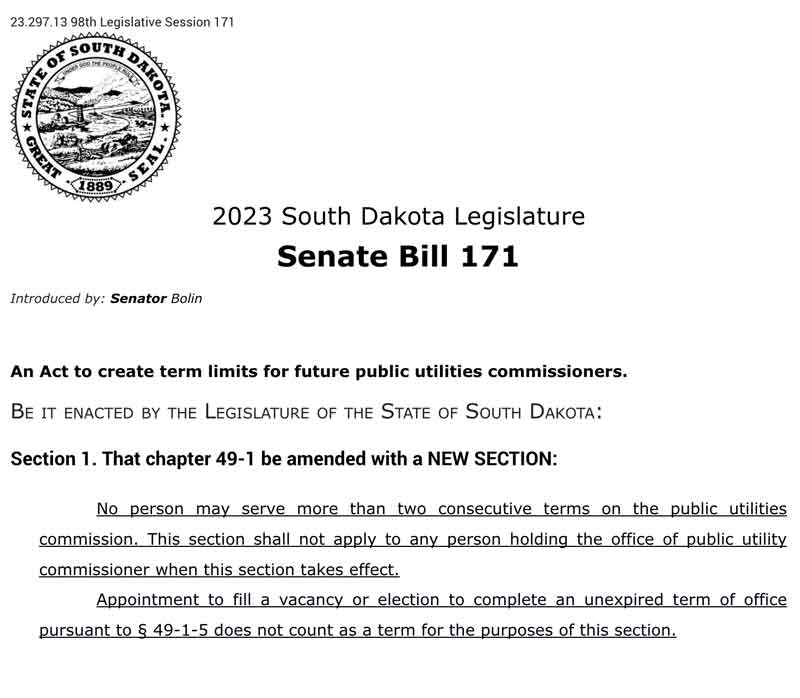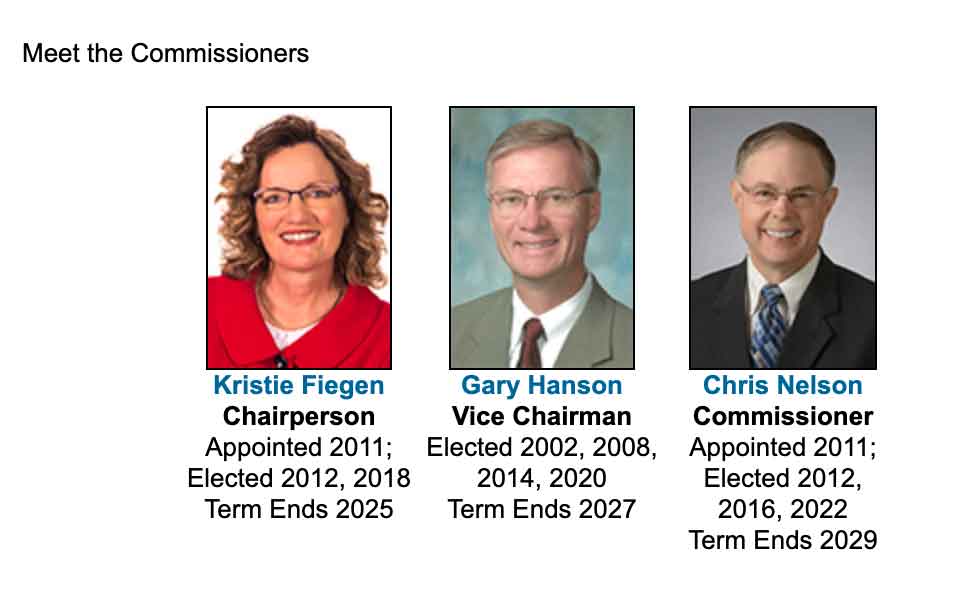Uh oh! Looks like Senator Jim Bolin is proposing to be a party pooper, and has a bill in to close an election loophole that has long been in existence for members of the Public Utilities Commission.
in 1992, South Dakota passed a Constitutional Amendment (Constitutional Amendment A) to set term limits for many elected officials. Many, as in “not all.”
Title: Relating to Term Limitations
Attorney General’s Explanation:
The South Dakota Constitution and other state laws do not limit the number of terms of office that may be held by a United States Senator, United States Representative, state senator or representative, attorney general, secretary of state, auditor, treasurer, commissioner of school and public lands, or public utilities commissioner.
The proposed amendment would limit an individual to two consecutive six-year terms (12 years) as a United States Senator, and six consecutive two-year terms (12 years) as a United States Representative, effective as of the 1992 election.
The amendment would limit an individual to two consecutive four-year terms (8 years) as attorney general, secretary of state, auditor, treasurer, or commissioner of school and public lands, effective as of the 1992 election.
This amendment would not place any limit on a public utilities commissioner.
The amendment would limit an individual to four consecutive two-year terms (8 years) as a state Senator or state Representative. This limit would not apply to partial terms to which a legislator may be appointed and to legislative service prior to January 1, 1993.
A vote “Yes” will change the Constitution as explained above.
A vote “No” will leave the Constitution as it exists.
“Shall the proposed change to the Constitution be approved?”
Full Text of Constitutional Amendment A:
That section 6, Article III of the Constitution of the state of South Dakota be amended to read as follows:
Section 6. The terms of office of the members of the Legislature shall be two years; they shall received for their service the salary fixed by law under the provisions of Section 2 of Article XXI of this Constitution, and five cents for every mile of necessary in going to and returning from the place of meeting of the Legislature on the most usual route.
No person may serve more than four consecutive terms or a total of eight consecutive years in the senate and more than four consecutive terms or a total of eight consecutive years in the house of representatives. However, this restriction does not apply to partial terms to which a legislator may be appointed or to Legislative service before January 1, 1993.
A regular session of the Legislature shall be held in each odd-numbered year and shall not exceed forty legislative days, excluding Sundays, holidays and legislative recess, except in cases of impeachment, and members of the Legislature shall received no other pay or perquisites except salary and mileage.
A regular session of the Legislature shall be held in each even-numbered year beginning with the year 1964 and shall not exceed thirty-five legislative days excluding Sundays, holidays and legislative recess, except in cases of the Legislature shall receive no other pay or perquisites except salary and mileage.
That Section 32, Article III of the constitution of the state of South Dakota be amended as follows:
Section 32. Commencing with the 1992 election, no person may be elected to more than two consecutive terms in the United States senate or more than six consecutive terms in the United States house of representatives.
That section 7, Article IV of the Constitution of the state of South Dakota be amended to read as follows:
Section 7. There shall be chosen by the qualified electors of the state at the general election of the Governor and every four years thereafter the following constitutional officers: attorney general, secretary of state, auditor, treasurer, and commissioner of school and public lands, who shall severally hold their offices for a term of four years. Commencing with the 1992 general election, no person may be elected to more than two consecutive terms as attorney general, secretary of state, auditor, treasurer, or commissioner of school and public lands.
As taken from the Secretary of State’s Website.
What the writers of the Amendment didn’t bother to care about was the fact that the Public Utilities Commission is a creature of State Law, and not a Constitutional Office. It was pointed out by the Attorney General at the time, but no one seems to have really cared since. Until now, with State Senator Jim Bolin’s proposal to put PUC Commissioners on even footing with other state level elected officials, capping their terms of office.

If you look at the membership of the Public Utilities Commission’s current membership, you can see where the argument could be made that an application of term limits might not be inappropriate.

With only two six-year terms, Kristie Fiegen is the most junior of commissioners, followed by Chris Nelson with three six-year terms, and Gary Hanson with 4. I’ve always mused that the PUC was the best gig in Pierre for a couple of reasons. The salary is not dictated in state law, nor are the terms of office. And as noted, Bolin’s bill seeks to close one of those loopholes, and force turnover… starting with “the next guys.”
Not that I blame him, as I certainly support Kristie Fiegen running for another term.. And I believe Gary has already said he’s not running again, but legally, I’m not sure how you can set a term limit without setting a date certain when it takes effect, versus making it based on the people in office.
We’ll see what the legislature has to say about it in the coming weeks.

The truth is this needs to happen. Term limits are not perfect, but they haven’t been horrible for statewide office holders. But agree that this needs to happen now – no reason to exempt the current office holders. Best gig in town is right — run every six years, take a nice salary, and then move on to a utility at some point.
The second part of this is that the PUC, along with at least the AG and SOS, should be elected in a primary. Why would give the whacky right the opportunity to take over the GOP convention, and elect their own nominees to these offices, is beyond me. We’ve seen it before and don’t be surprised if they try to take over the PUC.
We have term limits — they’re called elections.
Amen.
Imagine if districts had the institutional knowledge of Henry Poppen, Joe Barnett, Walter Dale Miller, Harold Halverson, Homer Harding, James Dunn, Lars Herseth, Bob Duxburry, Jerome Lammers, Roger Mckellips, George Shanard, Harold Sieh, Jim Stoick.
The legislature and the districts suffer in the current format.
Bolin is just mad that he couldn’t beat Brunner for public lands.
Term limits hurt the people and offices.
The legislature either self terms themselves before 8 years or they bounce back and forth for 20 years. I’d rather have a legislator in one chamber they want to be in and build seniority for 20 years than have them bounce around.
The legislators have only lost influence. If Chris Nelson, Gary Hanson were so bad we could have replaced them on the puc.
We all have carried water for them over the years. I’d hate to turn away someone good just because they need to be termed out.
We could get some real doozies if we run weak candidates.
When people run for the office with no understanding how the PUC works and what it is able to do, and make hysterical campaign promises to stop all pipelines, ban 5G and electric “smart meters,” and halt every other threat to archaic technology, they can get elected, and then face a reality check.
The problem I see is that the voters don’t understand what they do. They have to spend a lot of time explaining the job, to people who get their information from the likes of Alex Jones. Is this really such a sweet job?